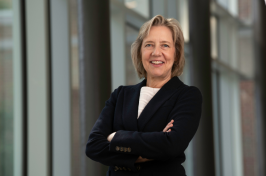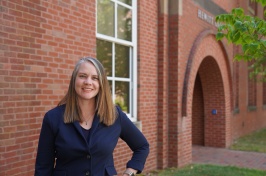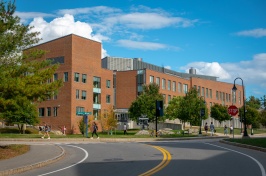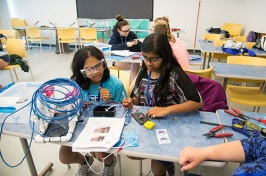New Program Brings Global Microfinance Pioneers to UNH May 31 - June 12
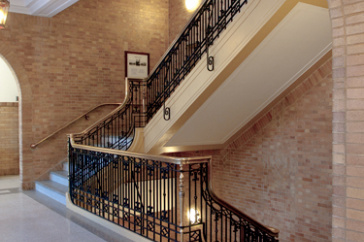
The renovation of James Hall restored many important architectural characteristics, including the central stairway.
DURHAM, N.H. - Microfinance, the business of providing small loans and other financial services to poor and self-employed clients who generally lack access to traditional banking, has emerged as a major but extremely complex arrow in the global anti-poverty quiver. Now, as the rapidly growing field weathers the worst financial crisis in half a decade, microfinance leaders from around the globe will gather at the University of New Hampshire for its first-ever Sustainable Microenterprise & Development Program (SMDP), a project of the Carsey Institute at UNH.
"We're providing very practical and applicable training to people who are on the front lines of very dynamic institutions," says SMDP coordinator William Maddocks. "It's about trying to build a more formal financial system in areas where they don't exist."
The program, one of the few such programs in the world, embraces the triple bottom-line: fostering microenterprise development that has positive social, financial, and environmental impact.
With three learning tracks - introductory microfinance, youth-inclusive financial services, and pro-poor enterprise development - the SMDP serves those new to the microfinance field as well as experienced practitioners who are seeking advanced financial management skill building. An anticipated 40 enterprise development professionals from a dozen countries are expected to attend the two-week program.
In addition, two colloquia, both in the Squamscott Room of Holloway Commons at UNH, are free and open to the public: "Microfinance Client Rights—Institutional Responsibilities" (Weds., June 2, 2010, 8 - 10am) and "Opportunities for Sustainable Energy Development Finance in a Time of Global Climate Change" (Weds., June 9, 2010, 8 - 10am).
The SMDP faculty includes some of the most seasoned microfinance and enterprise development practitioner trainers in the field, including Alejandro Escobar, Ann Gordon, Malcolm Harper, Jan Maes, Ellen Morris, Alexandra Snelgrove, Michael Swack, Rathi Mani, and Veronica Torres. Courses are designed using case studies, action plan development, collaborative problem solving, and ongoing communities of practice that keep practitioners connected and engaged after they leave the program and begin to put what they have learned into action.
Field trips round out participants' experiences. A trip to the Mount Washington Hotel at Bretton Woods (Saturday, June 5) will not only showcase some of the state's most spectacular scenery but also steep participants in the history of international finance as they learn about the 1944 Bretton Woods International Monetary Conference, which spawned the World Bank and International Monetary Fund. "The World Bank was established to provide financial means to develop underdeveloped countries," says Maddocks. "It has had a pretty big role in microfinance."
To learn about value-chain development, students will follow a product from farm to fork with a day of visits to the UNH Organic Research Dairy Farm, an organic dairy cooperative, Stonyfield Farms, and a local farmer's market (Thursday, June 10).
Maddocks, who previously directed the Microenterprise and Development Institute at Southern New Hampshire University, acknowledges that as microfinance matures, it's become increasingly complex. Nonetheless, he says, "the impact is very simple and direct: microfinance is raising the incomes of families and people so they can find solutions for very simple things, like enrolling their kids in school or drinking clean water."
In addition to the Durham program, the Sustainable Microenterprise and Development Program will offer workshops in Tanzania (Oct. 11 - 23, 2010) and Ghana (March 13 - 26, 2011). Learn more at http://carseyinstitute.unh.edu/smdp.html.
The Carsey Institute conducts policy and applied research on vulnerable families and on sustainable community development, giving policy makers and practitioners the timely, independent resources they need to effect change in their communities. Learn more at http://carseyinstitute.unh.edu/.
The University of New Hampshire, founded in 1866, is a world-class public research university with the feel of a New England liberal arts college. A land, sea, and space-grant university, UNH is the state's flagship public institution, enrolling 12,200 undergraduate and 2,200 graduate students.
-30-
Reporters and editors: William Maddocks, coordinator of the Sustainable Microenterprise and Development Program (SMDP) at the Carsey Institute at UNH, is available at (603) 862-0764 or mailto:William.maddocks@unh.edu"
Latest News
-
October 8, 2025
-
October 2, 2025
-
September 24, 2025
-
September 15, 2025
-
August 21, 2025












